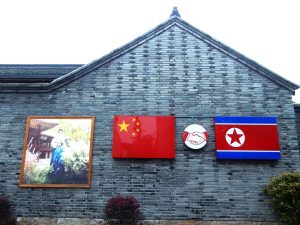As North Korea’s missile race approaches the finish line, the regime appears to be gearing up for its seventh nuclear test. Indeed, the successful launch of the Hwasong-18 suggests that the development of its intercontinental ballistic missile (ICBM) technology is nearing its final stage, with the only remaining step being nuclear tests aimed at lightening the weight of the missile’s nuclear warheads.
Are we going to just stand by and allow North Korea to cross the nuclear finish line? The country is already a de facto nuclear state; it is now on the verge of perfecting its ICBM technology. While the situation may at first appear dismal and without hope, we cannot afford to sit on our hands and do nothing.
To find solutions, first we must understand the internal driving force that has propelled the North’s nuclear missile program: the sacrifice of its people. North Koreans have been forced to lay down their lives to support the nuclear program, especially the overseas workers who earn hard currency for the regime. All the while, these workers endure unimaginable human rights violations. North Korean workers who recently escaped from their workplaces in Russia and Uzbekistan and defected to South Korea described horrific working conditions.
They reported that overseas North Korean workers toil more than 12 hours of physical labor per day without holidays and live in virtually uninhabitable communal housing. They are not allowed to leave the premises or contact their family, living in slave-like conditions under strict surveillance. Unable to bear such misery, some have even taken their own lives.
Up to 80 percent of their wages are forcibly appropriated under the pretext of donating to the “Loyalty Fund,” which has been used to support the Kim Jong Un regime’s nuclear missile program and the purchase of his luxury goods.
Currently, the biggest employer of North Korean overseas workers is China, with around 80,000 estimated to be living in Dandong, a border city between China and North Korea. Disguised as Chinese nationals, some are even traveling to African countries, such as Senegal and Algeria. This is in spite of U.N. Security Council Resolution 2397, which defines sanctions against North Korea, requires all U.N. member states repatriate North Korean workers by December 22, 2019.
A closer look at the circumstances surrounding overseas North Korean labor reveals two overlapping phenomena: First, the modern-day slavery of these laborers, who have been reduced to foreign currency-earning machines and second, China’s stance of feigning ignorance when it comes to Pyongyang’s nuclear weapons program.
The entire world knows that China is North Korea’s closest ally. I am not concerned with singling out China for blame, but its aiding and abetting of the North’s nuclear missile program demand our unwavering attention. In fact, the intensifying hegemonic competition between the United States. and China is not unrelated to the North’s nuclear missile development. In light of this, we must seriously examine what has driven the recent reinforcement of the U.S.-South Korea-Japan security cooperation, and how NATO’s interest in Asian security will affect China’s national security.
Against this backdrop, China must reconsider its stance on the hiring of North Korean workers. Their repatriation – in line with U.N. Security Council resolutions – could be instrumental in curbing the North’s nuclear ambitions. While it may seem like a small measure, such repatriation would send a strong message to Pyongyang. Blocking North Korea’s most reliable source of hard currency will jeopardize its plans to advance its nuclear missile program, dealing a decisive blow to the Kim Jong Un regime, which has survived on the lifeline of Beijing’s backing.
Such intervention could also yield countless advantages for China. Not least, China’s relationship with the United States and South Korea would improve dramatically, and some of the dark clouds looming over the Asia-Pacific region would dissipate. The end of the Cold War opened the door for China to accumulate tremendous wealth and power, elevating it to the status of a global superpower. Hence, China should seriously ask itself the question of what has caused cracks to appear in this favorable global system and who is responsible.
If China’s concern for North Korea is genuine, it should rescue North Korean overseas workers from slavery-like conditions and actively provide food relief to the North Korean people who struggle daily with hunger. Undoubtedly, such humane measures would profoundly elevate China’s global standing.

































